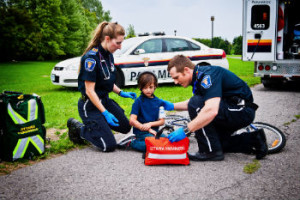How Do Paramedics Cope?
 Paramedics deal with life and death situations as a routine part of their work. Like any health care practitioner, a paramedic can only do so much – no matter how skilled. There’s no rhyme or explanation, despite best efforts put forth, why one patient lives and another dies.
Paramedics deal with life and death situations as a routine part of their work. Like any health care practitioner, a paramedic can only do so much – no matter how skilled. There’s no rhyme or explanation, despite best efforts put forth, why one patient lives and another dies.
A typical day on the job may not present itself with much more than transporting patients who are not desperately ill to and from hospitals for their appointments. Sometimes a paramedic might have to use specialized equipment such as an electric hoist or hydraulic jack to save a life. Other days a paramedic might be called in to assist with a situation that he or she never dreamed to be involved with, or only learned about in theory class. The day to day experiences are all over the map, and one day may not guarantee that the next will be anything similar.
When a person graduates from emergency training classes and chooses the hands on, street wise profession of emergency medicine he isn’t exactly on the the limo ride of his life, but more like the tilta-whirl. Everyday offers possibilities to learn and help live.
There are stories from the mundane to the heroic. There are stories that break hearts of paramedics who are supposedly seasoned and long timers in the field. These first-responders see it all, and most never get accustomed to the fact that lives can vanish before their very eyes.
They call it a good day when they assist in a birth, or save someone from the brink because they got to them with the right moves in the nick of time. A big pay-off is the smile on someone’s face when that person knows they are going to be alright because the paramedics acted as the much needed bridge between misfortune and miracle.
Kids are the hardest according to most emergency medical responders.
“When we arrived the teenager was stiff and hard as a rock. He had been laying in his parents’ backyard all night and unconscious from apparently consuming too much alcohol. Despite what appeared to be the obvious, we followed policy and put him on a cardiac monitor, placing electrical pads to see if we could get an electrical impulse. Much to our surprise, the ECG registered magnetic activity from the heart and we immediately began CPR. We had a pulse and his heart rhythm was nearly completely normal.
An Etd tube was inserted into the boy’s trachea to help him breath and an intravenous cannula was inserted into his jugular vein to admin adrenaline. The patient gave a moan and attempted to pull the cannula from his neck – using both arms that minutes before were stiff and rigid from what looked like the early stages of rigor mortis. ‘We got this’, was my thought, and although I knew better than to celebrate too early, I was feeling a small sense of relief for this young man and his family. Unfortunately, within five minutes before arriving at the hospital he flat lined, and even with thirty minutes of intensive care that followed, the young man passed.”
This had to be tough. From hopelessness to hope back to hopelessness within an hour.
How do paramedics keep from getting consumed by the tragedies they witness so often?
The most common response is that everything happens so fast. When called onto a scene of death and trauma paramedics react from training and compassion. What is foremost, is the mechanical response based on extensive preparation, knowledge, skill, theory, policy and procedure.
The job at the moment doesn’t allow for an emotional takeover. Many paramedics detach after the patient is turned over to the doctors, knowing that their part in the play is over, and they played it to the best of their ability. However, it’s very human to get involved with some cases, and it’s not unusual for first responders to – if circumstances allow – stick around after a patient has been admitted to the hospital to hear a final outcome.
They can’t allow themselves to shut down and become empty, yet at the same time being overly involved can too often rip out the heart of any seasoned professional. A balance is met to accept and release. On many occasions a true knowing with a deep sense of satisfaction is rightfully theirs, realizing that they made a difference that day.
Your comments are appreciated. Leave a statement or a story below and maybe I can learn more and write about it in Paramedicsaleries.org.